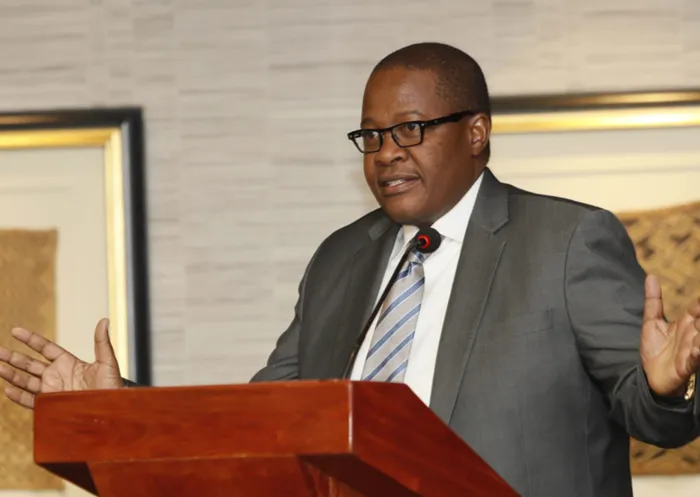Little sympathy as Molefe quits

Eskom chief executive Brian Molefe File picture: Simphiwe Mbokazi Eskom chief executive Brian Molefe File picture: Simphiwe Mbokazi
Parliament - Eskom chief executive Brian Molefe’s decision to fall on his sword has been met with scant sympathy, with Corruption Watch and the EFF urging the board to think about following suit, while the DA said it would lay criminal charges.
The EFF said Molefe’s resignation on Friday was “a step forward in cleansing state institutions of all who are linked to the Zupta criminal syndicate”.
Corruption Watch said any alleged criminal or irregular conduct by Molefe could not have been possible without the consent of the board, particularly chairman Ben Ngubane.
It said the prominence of Eskom demanded public confidence in its operations, functioning and leadership, and the board should consider “whether their continued leadership of the parastatal is in fact in the best interests of Eskom”.
But Ngubane showed no sign of following Molefe out the door, thanking him for “his relentless dedication to turning Eskom around, solidifying a capable executive team, and putting it on a sound growth trajectory”.
Eskom would soon announce interim leadership arrangements after these had been agreed with Public Enterprises minister Lynne Brown, Ngubane said.
Brown said she was “saddened” by Molefe’s decision, but respected it. “Mr Molefe has been instrumental in developing Eskom’s turnaround strategy and it is disappointing that he will not be present to see it to complete fruition,” she added.
She would “work closely with the board” to make sure Eskom remained stable.
DA spokeswoman on public enterprises Natasha Mazzone said it was suspicious that Molefe had resigned after her party had requested he be summoned before Parliament’s public enterprises oversight committee to testify under oath.
“His resignation for the benefit of the public and Eskom’ can be seen in no other light than that of an admission of guilt,” Mazzone said.
The DA would lay criminal charges under the Public Finance Management and Prevention of Corrupt Activities acts, she said.
Greenpeace campaign manager Melita Steele described Molefe’s resignation as “a victory for accountability and transparency”.
“Since Brian Molefe was personally spearheading Eskom’s anti-renewable energy campaign, this news is good for all South Africans,” she said.
A clearly bitter Molefe said he was walking away in the interests of the company and “good corporate governance”, stressing it was not an admission of guilt.
But he offered no explanation for his 44 phone calls to Ajay Gupta in the months leading up to the purchase by the family’s Tegeta Exploration and Resources of the Optimum coal mine, in which Eskom played a pivotal role.
The phone calls between August last year and March, along with 14 from Ajay Gupta to Molefe, were revealed in records obtained by Madonsela from Molefe’s cellphone service provider. They also showed he was in the vicinity of the Guptas’ Saxonwold compound 19 times in three months.
Molefe was scathing about Madonsela’s decision to release the report before completing a full investigation, saying it was “a matter for regret that the report was prepared in haste related to the public protector’s own departure from office”.
“That her office continues, as all state offices do, and that any uncompleted function is completed by a successor in that office, was not a consideration in the report,” Molefe complained.
He said Madonsela’s “observations” in the report relating to his conduct were “in material respects inaccurate, based on part facts, or simply unfounded”. He had not been given a chance to reply to “harmful disclosures” before the release of the report, Molefe said.
His resignation followed an earlier statement by President Zuma in which he complained about Madonsela making public comments about the report after leaving office last month, and urging her to “step back and allow legal and constitutional processes to unfold unhindered”.
He said the presidency remained concerned by the “leaking” of a recording of his interview with Madonsela relating to the investigation. It had “serious implications with regards to ethics, confidentiality and the protection of information gathered during investigations”, Zuma said.
This comes after he told the National Council of Provinces last week that he had not been given a chance to respond to allegations made in the report.
However, the recording showed this to be untrue.
Madonsela has explained that she authorised the release of the recording, which she is empowered to do by the Public Protector Act, to show Zuma had been given an opportunity to put his version of the facts.
The report detailed how Eskom drove Optimum into business rescue by refusing to relax the terms of a coal supply agreement it had with the owner, Glencore, before helping to fund the purchase of the mine by Tegeta, in which Zuma’s son Duduzane holds a 28 percent stake, by prepaying R600 million towards coal supplied by the mine before it changed hands.
The decision to make the prepayment was taken by the board on the same night Tegeta was refused funding by its banks to cover a shortfall of the same amount.
craig.dodds@inl.co.za
Political Bureau